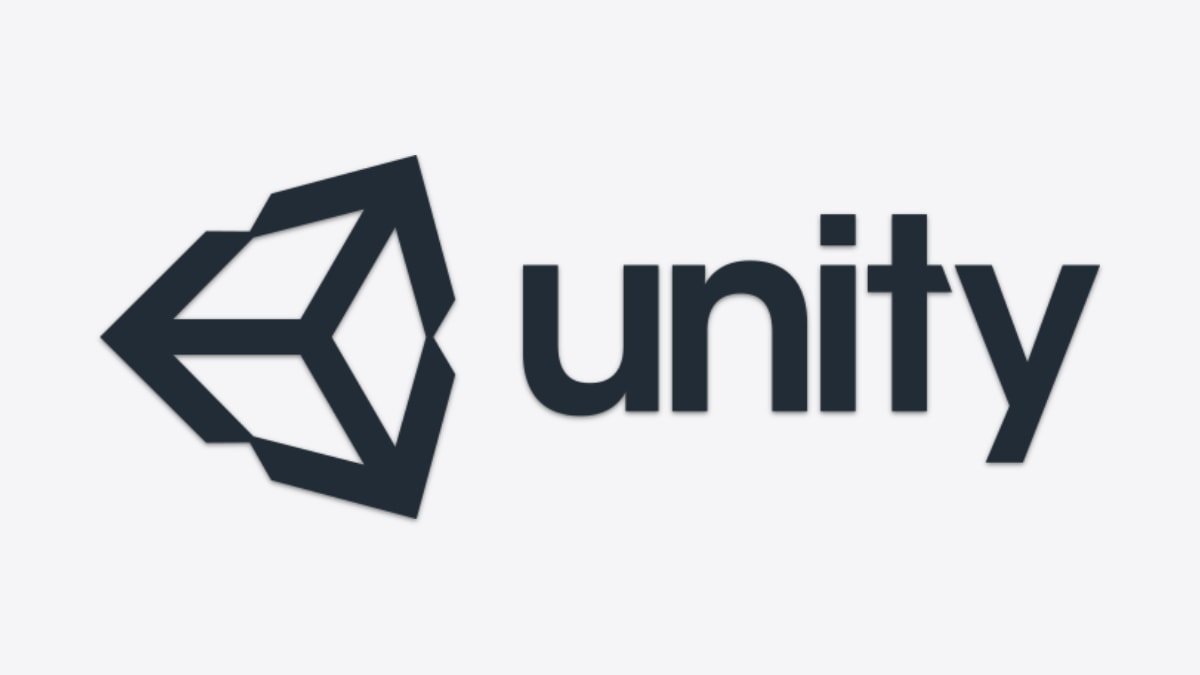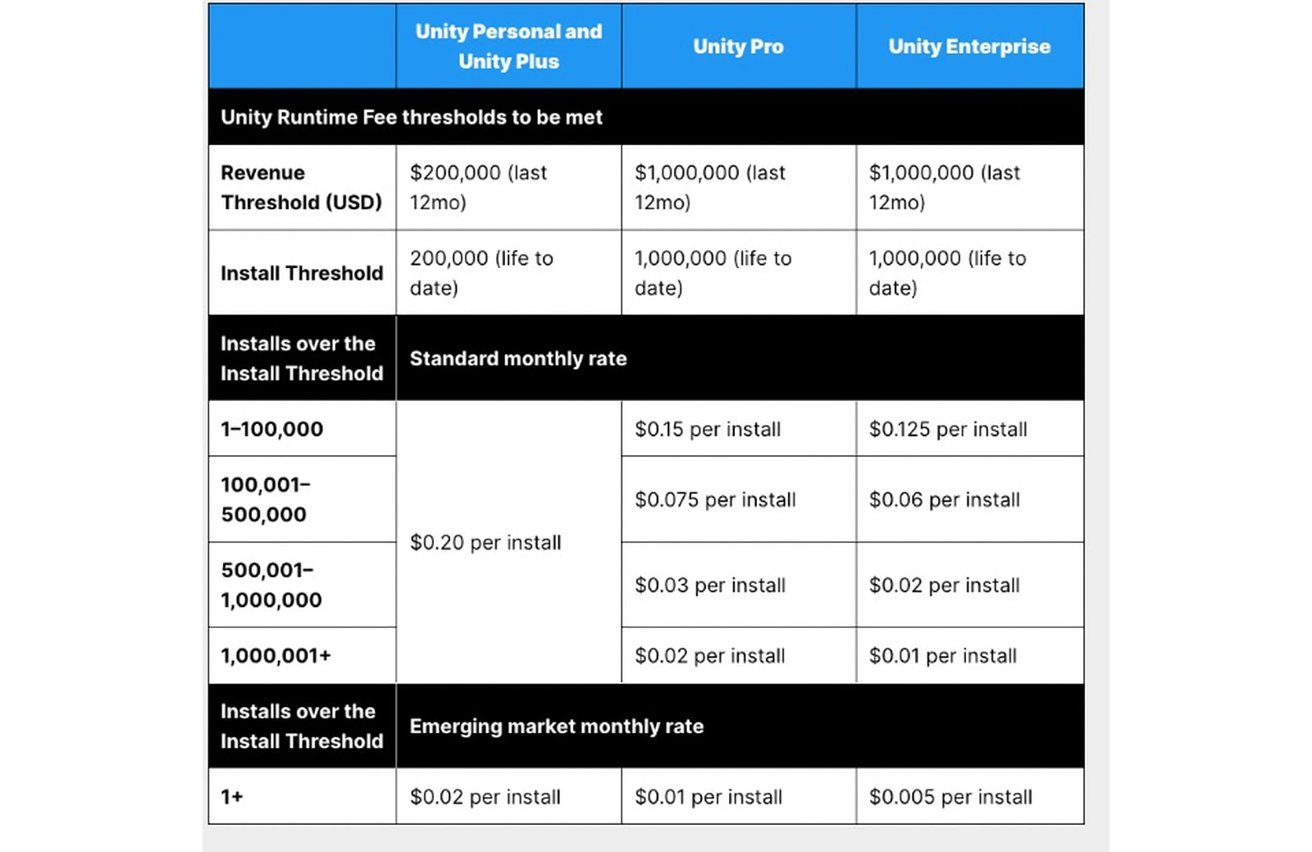iPhone & Mac game engine Unity putting the screws to independent developers
The indie game development community is in turmoil following Unity's announcement of a new pricing system that will charge developers per user on initial download, instead of a flat engine licensing fee.

Unity is setting a new fee for independent games developers
Unity is a cross-platform game development engine widely used to create 3D and 2D games and interactive experiences. It powers over 60% of top-grossing games on the App Store.
The company announced recently that on January 1, 2024, it will charge developers a new "Unity Runtime Fee." The thresholds for Unity Personal and Unity Plus users are set at $200,000 in revenue over the past 12 months and 200,000 lifetime installs.
Once surpassed, developers will be charged 20 cents per install. The new fee has received widespread criticism from indie developers, such as Tom Francis of Heat Signature.
"A partner who can and will change how much of your revenue you owe them after you've made and released your game needs to be avoided like the plague," Francis tweeted. "I hadn't realized they even legally could."

Developers fear the new fee system could cost them more than they earn from their games. The policy also affects games already released, leaving developers feeling trapped and foreseeing financial threats.
The new system could lead to potential abuse, including fraudulent installs, which could incur unjust developer charges. The policy also complicates participation with in-game giveaways, charity sales, and bundles, though Unity said that subscription services like Microsoft Game Pass wouldn't be affected.
Developers also want to understand how the new Unity Runtime Fee would apply to games that have been offered for free on platforms like Epic Games, as these apps have a substantial number of installs, potentially leading to significant fees under the new structure.
"I gather Epic's Unreal license is perpetual per-version, so whatever the deal is when you commit, you're guaranteed that forever if you're happy to stick with that version," Francis continued. "5% is more than Unity's new fees in most scenarios, but compared to a company that can help themselves to any amount of your money at any time, suddenly sounding more reasonable."
Unity has responded by stating that the fee will affect a small subset of users and is designed to impact only those who have successful games, generating revenue well above the outlined thresholds. However, the developer community remains skeptical, with many vowing to switch to other engines for their projects.
Read on AppleInsider

Comments
Apple should tell everyone complaining about this hypocrisy and let developers know they are actually getting a good deal.
That developer went from only giving Unity $20K total, to now $200K per month. In one year it will cost them 120x more. It will bankrupt them.
That's the fastest change in price structure I've ever seen. Your game went from making you $180K in a year, to costing you $200K each month.
The Pro license gives you 1,000,000 free installs. If you get more downloads than this and make more than $1m, like say 100m downloads, the charge per download goes down to $0.02 for most of the other 99m downloads. That's still crazy though at ~$2m because it could be more than you make if it's a free-to-play game.
These changes happen when a company has been mismanaged and is struggling financially. Unity has only recently made a profit and has been losing money all the time until then and not a small amount - billions in losses.
Just like what happened with Reddit, they come up with a crazy plan on how to make money and are prepared to burn every bridge because they are in survival mode.
Reddit was in the position to do it and will be ok. Unity isn't in the position to do this. They aren't the leading game engine developer. It won't be easy for every developer to switch to another engine. Genshin Impact is built on Unity for example and cost hundreds of millions of dollars to make but a lot of the cost is asset creation and code, which doesn't have to be remade from scratch.
Unity earnings are here:
https://investors.unity.com/financials/sec-filings/default.aspx
https://finance.yahoo.com/quote/U
The worst part isn't so much the pricing but that they can change the terms whenever they want, to arbitrarily harmful terms and game devs investing so much time and capital have to deal with it. Once that trust is broken, devs will abandon the platform. The question is to what? While Unreal is an obvious choice, it's a very heavy engine for Indie developers and is mainly designed for high-end AAA games with a steep learning curve.
Maybe this will be a wake up call for game studios that there needs to be an engine separate from an individual company's or even an individual company owner's (Sweeney) problems. A lot of companies already make their own engine, they could easily all share an engine and contribute to it. It would be best to be a minimal core engine that companies can build out with their own extras.
The core engine would mainly need to cover the renderer and the target platform deployment, which are the hardest parts. Once you can handle realistic lighting and shading and deploy to multiple devices, the rest can be handled by small 3rd party code libraries.
Like a landlord? Excuse me a Slumlord…….
Scratch that, I keep getting Unreal and Unity confused.
Unity is an entirely separate company that makes their on suite of 3D tooling to make 3D entertainment, software and games. Their 3D engine is referred to as "Unity".
They are competitors, and offer similar tools and services. In the end, they would offer the same licensing costs to remain in detente for the relative market positions. If this new licensing structure presents a revenue problem for them, they will back off or do something different as there is a competitor that potential licensees could switch to.
https://en.wikipedia.org/wiki/List_of_game_engines
All these companies tried to reinvent the wheel making an engine of their own, solving the same problem over and over to end up with dozens of buggy proprietary engines that work for one product or franchise and with very little transferrable skills for the people who work with them.
A lot of them have reached a point where the saw how much effort and pain was involved maintaining an engine internally that many of them are now looking at Unreal engine but they don't control the engine.
If all of the studios pooled their resources together, they could make a strong, reliable core engine that everyone could use and know that it would be supported everywhere.
My read is that if you get $200k revenue per year from your app (using Unity personal or Plus) you can have a maximum of 83,333 extra installs before the cost of the engine equals your revenue - fewer if Unity counts gross revenue rather than net of app store fees. Over the lifetime of the app, that's rather limiting. Basically, once you're making $200k pa you should pay for the Pro version of the Unity engine, at which point you don't get charged extra until you hit $1m p.a. in revenue.
Unity Pro is $2040 per year per seat, billed annually. So for an individual developer already making $200k revenue it is about 1% of their income in return for no extra monthly fees on app downloads (until your annual revenue reaches $1m). From a business perspective I think that's reasonable, but it's a significant change from their previous pricing regime.
As @Marvin pointed out, once you reach tens of millions of downloads you're in uncomfortable territory. You can pay for the Enterprise version ("contact our sales team!") or the Industry version ($4950/seat/year) and reduce your monthly fee by 50% but you're quickly going to reach a point where the licensing costs outweigh your revenue. This is the point where I think Unity will have to back down and negotiate a flat fee or a portion of annual revenue with the game developer, otherwise the game disappears and nobody makes money. My instinct is that any game with >10m installs is going to be able to generate more than $1m annually, but I don't work in the industry so I don't know. I mean, I guess if you ensure that you never charge your user base more than $1m annually you won't have to pay anything to Unity, but that means you're not fully exploiting the commercial potential of the game
Unity's approach has got game developers asking if they need to consider a different engine, on the off chance their game becomes a hit. That's a big problem. I'm sure they've got data telling them that most games aren't going to be killed by their new policy, but by not sharing that information and waiting for the developers to fully grok it before making their licensing change they've let fear tell the story.
Also, I'm not clear about installs and uninstalls -- if a user installs, later uninstalls, and then installs again later, does Unity charge you for two installs? I'm assuming they do, since the uninstall would (presumably) eliminate the monthly install fee for the first install. But depending on the period of time that this takes place, this could create a jump in expenses for a developer -- but the idea that a large amount of users installing, uninstalling, and installing again probably isn't normal, so this wouldn't be an issue.
As far as I know, Unity isn't profitable, so the sustainability of the company that makes the engine should be considered.